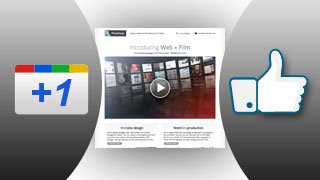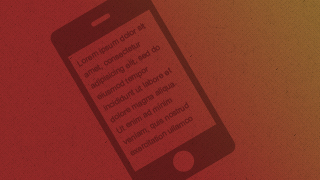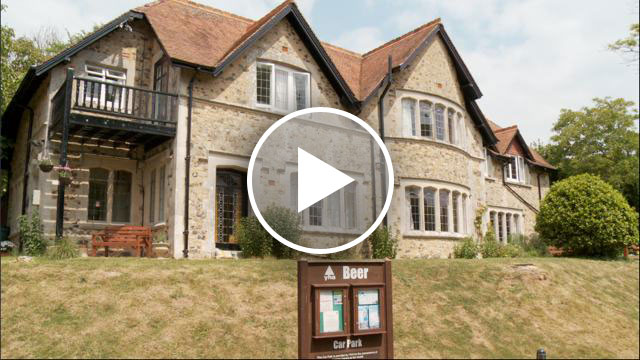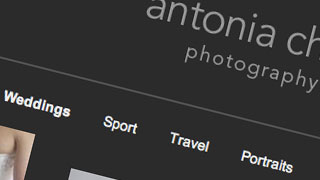Do you need a website as well as social media?
Written by Ben Vallack on
Tuesday, November 15, 2011 at 10:10AM
Filed in:
Website design
Tags:
webdesign,
seo,
social media
Comments: 0
This article is going to look at the differing roles of social media and your website. We’ll explore the difference between the two as well as looking at the overriding importance of your website.

TV ads and Facebook 'Pages'
You may have noticed many big companies showing Facebook page addresses at the end of their TV ads, where once there would have been their own website displayed. On the surface, this appears as though the Facebook page has effectively replaced the website.
What's actually happening is that these companies are running a specific campaign which aims to harness the viral power of social media to increase the reach of their ads. They will more than likely be using an advanced landing page on their Facebook page to obtain email addresses as well as other mechanisms to incentivise people to share and talk about their product.
What's happening is that social media is being used as a multiplier of the effectiveness of a specific marketing campaign. Once upon a time, an ad would have a goal of getting a new customer to buy a product or at least visit a website, now the idea is to generate social hype about the product, which will in turn result in more sales.
What's more, all traffic that goes through the social media channels will have an easy path to return to the company's actual website where they can invest further in the brand and product as well as actually buying the product, or finding out where they can buy the product.
The important difference between big companies and the 'small business'
It is important to remember the big difference between these large national companies and a small business in terms of how their products are sold. If a product is available to buy off-the-shelf in high street shops and supermarkets, then the aim of the marketing is to ensure a customer chooses that product over their competitors as they are walking down the isle. This is why brand reinforcement is so important. Social media is particularly effective at this because a large part of this sort of marketing is reassuring people that many other people are also making the same choice.
If you're a small business, however, things are quite different. If you're selling a product you're most likely going to be selling that product on your website. For you then, the role of your own website is quite clear. You can use social media to attract more interest in your product and use it as a marketing channel, but you'll still need those people to end up on your website to make a purchase.
But what about if you're selling a service? In your case, your online goal isn't the sale of a product, it is lead generation. A 'lead' is someone who makes contact with you and will potentially use your service. If your business works like this, you might be starting to think that an active social media presence might be sufficient at achieving this. After all, social media makes it very easy for people to get in touch with you.
However, if we explore why people actually use social media we'll see why this wouldn't be nearly as effective as if you combined it with a real-world website.
Can small business still use social media 'Pages'?
Absolutely, yes. Facebook and Google+ 'Pages' are still a great way for small businesses to represent themselves on social media. In their basic format though, they are still very similar to a normal personal page. That is, they include a list of shared links or messages.
Although they do have a handy way of listing key information about your business using the profile fields, this is of course no substitute for actually publishing quality content on your own website.
One of the main differences between a 'Page' and a normal personal account on social media sites is that the 'Pages' are inherently more public. Information is public by default and there is no need to become 'friends' before you can view content from a 'Page'.
Other than that and a few other technical differences, the format is essentially the same.
The social media format
Social media is effectively a micro-blogging platform designed for sharing content and short messages. We can broadly classify the vast majority of social media content as either a brief message (or 'status'), or a link to larger content elsewhere.
The people who use social media use it because they enjoy being shown content from those who they respect enough to 'follow/like/add'. There is so much content out there these days that people are waiting for content to be recommended to them as a way of filtering the pages, articles, images and video they want to view.
In many ways this process is a refreshing and natural return to the old fashioned way of recommending people and things to others. Instead of relying on a search engine to discover who is trustworthy (and lets face it, there's a limit to how effective a search engine can be), people are using other people's experience and recommendations as a starting point for their online exploration.
Social media is for sharing, not publishing
So, in summary, it's important to remember that the main role of social media is to share content, not publish it. For that, you still need a great website. In fact, a good quality website has never been more important if you want others to share your content.
About the author
Ben Vallack is a web designer and filmmaker and provides high quality services which don't cost the earth. Get in touch with Ben:


 Filtering email spam without risk of false positives
Filtering email spam without risk of false positives Why you don't need a separate mobile website
Why you don't need a separate mobile website Great crested grebe footage used in BBC's Natural World
Great crested grebe footage used in BBC's Natural World Quick guide to �Like-gate� or �Fan-gate� pages on Facebook
Quick guide to �Like-gate� or �Fan-gate� pages on Facebook 4 Quick Ways to Improve your Website Content Writing
4 Quick Ways to Improve your Website Content Writing Website Design Primer: Common Concepts and Jargon Explained
Website Design Primer: Common Concepts and Jargon Explained New webfilm production: Beer YHA
New webfilm production: Beer YHA New SetSeed powered website design: Antonia Chick Photography
New SetSeed powered website design: Antonia Chick Photography 6 Steps to Improving Search Engine Ranking for Beginners
6 Steps to Improving Search Engine Ranking for Beginners




There are no comments yet. Be the first to add a comment by using the form below.